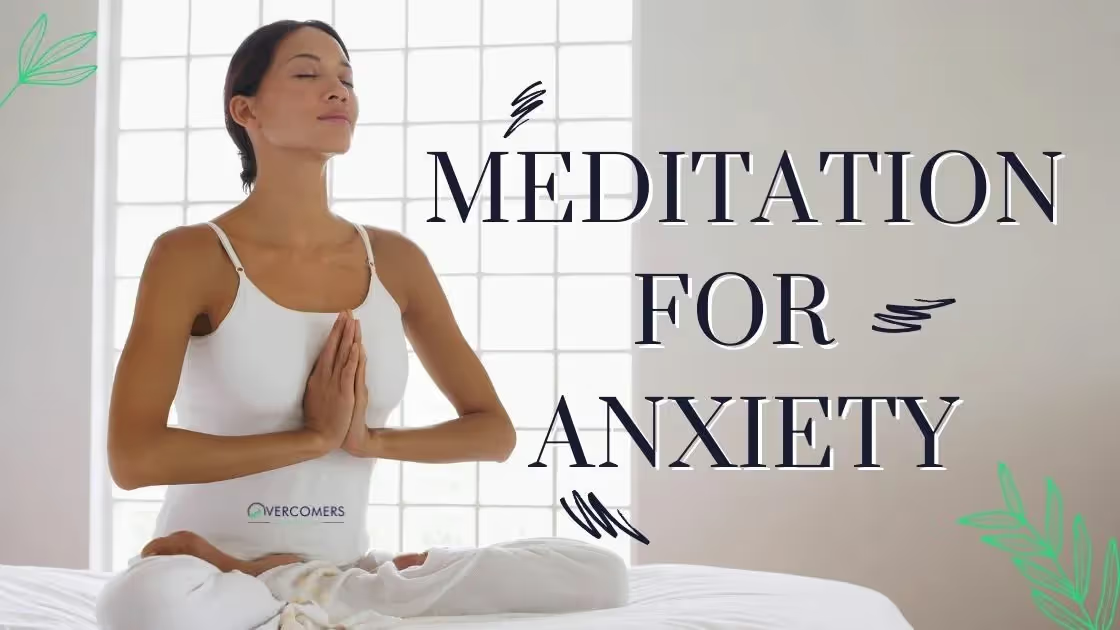There are many benefits of meditation for anxiety and stress.While nothing replaces professional treatment for anxiety, stress, or depression, studies do...

There are many benefits of meditation for anxiety and stress.
While nothing replaces professional treatment for anxiety, stress, or depression, studies do show that mindfulness and meditation can reduce the difficult symptoms of mental health struggles when incorporated into your daily life.
Studies done by the Mayo Clinic show that practicing meditation is an effective method for dealing with stress and anxiety.
Meditation has been shown to significantly reduce feelings of stress, anxiety, insomnia, and depression.
Meditation has also been shown to help with the reduction of physical ailments: it can help lower chronic pain levels, heart disease, high blood pressure, irritable bowel syndrome, and reduce overall inflammation in the body.
Recent studies into people with chronic depression and anxiety have found that Inflammation in the body is highly-correlated to feelings of anxiety and depression.
Meditation is a simple activity that has been shown to drastically improve both mental and physical health.

Meditation is the act of taking control of your awareness. Most of us live our lives on auto-pilot. We don't really pay attention to what's happening around us. And, we don't really pay attention to what's happening inside of us.
We get up when we're supposed to. We eat breakfast quickly. We rush to get to work. We participate in our work tasks and our conversations without really focusing on them.
Meditation is like pressing pause and allowing yourself to be fully in the moment.
It's also about focusing the mind. Our mind is constantly showing us thoughts and feelings. Meditation teaches you how to not let your thoughts or feelings control you. It can be especially useful for people who struggle with chronic anxiety and emotional regulation.
Meditation teaches you control.
When you meditate, you take active control of your focus, your breathing, and your body.
This is why meditation for anxiety and stress is so effective.
There are different types of meditation for anxiety and stress.
You can try all kinds of meditation to find a method that helps you the most.
Mindfulness Meditation is meditation with the purpose of becoming fully focused on the present moment.
You're letting go of the past that no longer exists. You're letting go of the future which doesn't exist yet.
Your attention is focused totally on what's happening here and now.
One great thing about mindfulness meditation is that you don't have to be sitting still to do it.
You can focus on being mindful and present at work, in your car, while waiting in line, while doing chores or household tasks, or watching your kids play sports.
While practicing mindfulness meditation, the goal is to let go of judgment and attachment.
You don't deny your thoughts or feelings, but you also don't attach to them. You simply observe them.
Transcendental meditation was made popular in the West during the 1960s when The Beatles went to India to study transcendental meditation. (Dear Prudence was inspired by John Lennon's meditation practice.)
In transcendental meditation, the practitioner sits with their eyes closed and repeats a mantra, sound, or phrase for 20 minutes.
Christians and members of other religions might choose a phrase from the Bible.
You might choose a relaxing sound. Or, select a word that represents a feeling that you want to create.
In guided meditation, you are led by a teacher, an app, a video, or audio into imagining relaxing situations.
You'll be creating pictures in your mind as directed.
Guided meditation can be a great way to start meditation for anxiety for beginners.

Meditation for anxiety and stress has been shown to have many benefits.
A recent study of 1300 adults who meditated every day for two months found that everyone who participated reported lower anxiety and stress levels.
Most importantly, those with the most extreme forms of anxiety reported the most drastic improvements.
This shows how effective meditation for anxiety can be.
Mediation when coupled with positive affirmations showed even more improvement for those with chronic anxiety than meditation alone.
This same study showed that people who experienced job-related anxiety saw a drastic reduction in symptoms through meditation.
They performed better at their jobs and experienced less anxiety and stress because of work.
Meditation for anxiety and stress is very effective.
However, meditation can also improve your physical health.
Meditation improves your physical health by boosting your immune system.
A particularly great benefit when living through a pandemic!
It also reduces inflammation, increases cellular regeneration, and increases the production of disease-fighting chemicals.
Meditation for anxiety can also stabilize your blood pressure, heart rate, metabolism, and sleep cycles.
If you're planning to get pregnant, meditation has been shown to increase fertility and infant help in women.
While you might start meditation for anxiety, you will keep doing it because of all of its benefits.
Meditation for anxiety and stress is a great tool to add to your life.
It's something that you can start right now.
And, while it doesn't replace treatment, it can provide you with a tool you can use in addition to treatment.
If you want to feel better, mediation for anxiety is a great choice.
Yes, Medicaid provides insurance coverage for therapy services specifically designed to help individuals struggling with anxiety, depression, and other mental health conditions.
Addressing anxiety is crucial because it can significantly impact your quality of life and overall well-being. Left untreated, anxiety can lead to more severe mental health issues, relationship problems, and difficulty functioning in daily life.
It's important that you feel comfortable discussing personal matters with your therapist in order to open up and get more out of therapy sessions; therefore finding someone who meets certain criteria like experience level, expertise areas, and personality is key when selecting a therapist who can give meaningful feedback about how best handle issues related to anxiety or other mental health concerns.
Ignoring anxiety can exacerbate symptoms and make it more challenging to manage over time. This can result in a negative impact on your personal, professional, and social life, leading to feelings of isolation and even depression.
To reduce your anxiety, you can practice relaxation techniques such as deep breathing, progressive muscle relaxation, guided imagery, and mindfulness practices. Additionally, regular exercise has been found to be beneficial in managing stress and improving mental health.
Other activities which have been found helpful in reducing both immediate feelings of anxiousness and long-term anxieties associated with chronic disorders include yoga, journaling, nature walks, art therapy, volunteering, and other low-stress activities. Additionally, developing a healthy lifestyle incorporating adequate sleep, physical activity, and nutritious meals can help reduce overall stress levels.